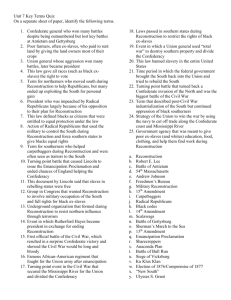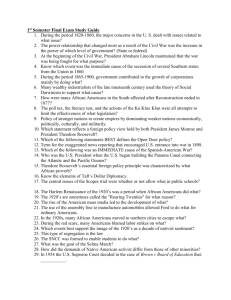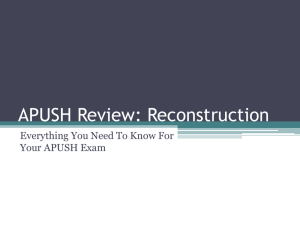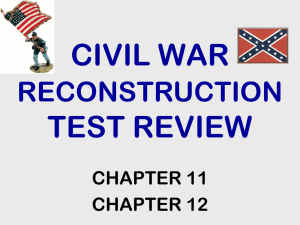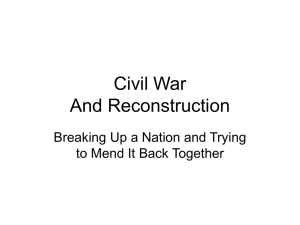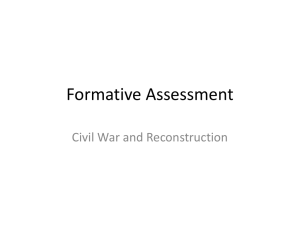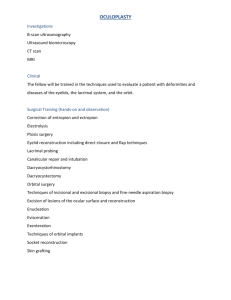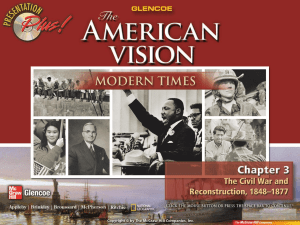Unit 7 Key Terms (Academic)
advertisement
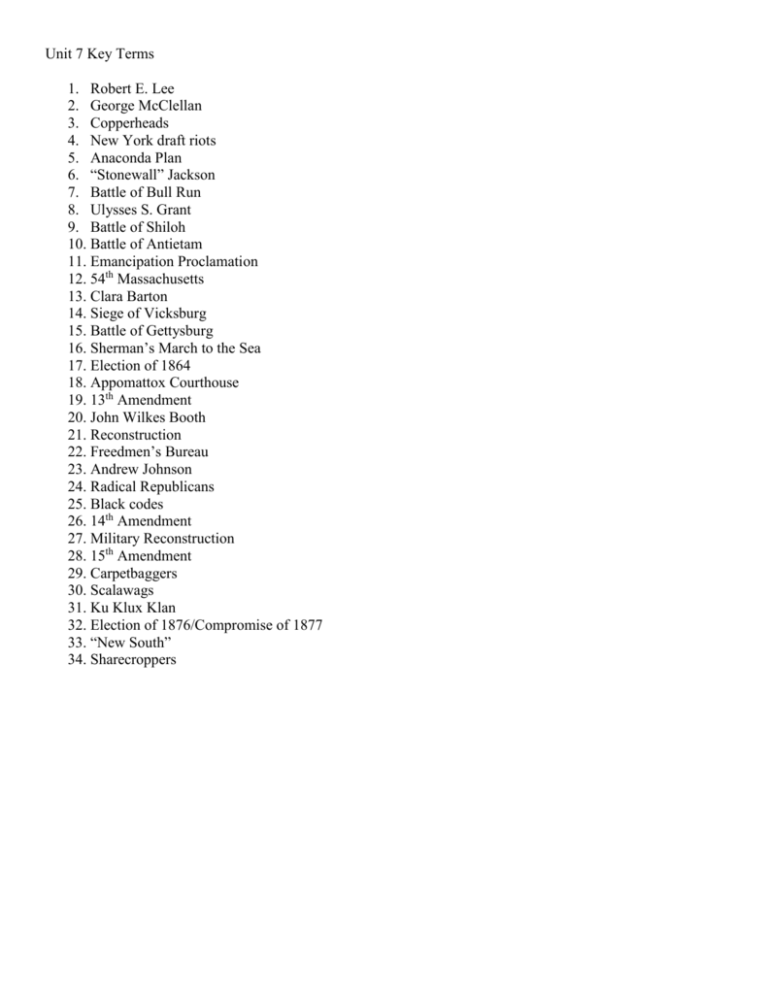
Unit 7 Key Terms 1. Robert E. Lee 2. George McClellan 3. Copperheads 4. New York draft riots 5. Anaconda Plan 6. “Stonewall” Jackson 7. Battle of Bull Run 8. Ulysses S. Grant 9. Battle of Shiloh 10. Battle of Antietam 11. Emancipation Proclamation 12. 54th Massachusetts 13. Clara Barton 14. Siege of Vicksburg 15. Battle of Gettysburg 16. Sherman’s March to the Sea 17. Election of 1864 18. Appomattox Courthouse 19. 13th Amendment 20. John Wilkes Booth 21. Reconstruction 22. Freedmen’s Bureau 23. Andrew Johnson 24. Radical Republicans 25. Black codes 26. 14th Amendment 27. Military Reconstruction 28. 15th Amendment 29. Carpetbaggers 30. Scalawags 31. Ku Klux Klan 32. Election of 1876/Compromise of 1877 33. “New South” 34. Sharecroppers 1. Government agency that was meant to give poor ex-slaves (and whites) education, food, clothing, and help them find work during Reconstruction 2. Poor farmers, often ex-slaves, who paid to rent land by giving the land owners most of their crops 3. Union general whose aggression won many battles, later became president 4. Battle that established Ulysses S. Grant as a top general but at the cost of heavy Union casualties 5. Underground organization that formed during Reconstruction to resist northern influence through terrorism 6. Event in which Rutherford Hayes became president in exchange for ending Reconstruction 7. Confederate general known for the bravery he showed in the Battle of Bull Run who was later killed in the war 8. First official battle of the Civil War, which resulted in a surprise Confederate victory and showed the Civil War would be long and bloody 9. Turning point battle that caused Lincoln to issue the Emancipation Proclamation and ended chances of England helping the Confederacy 10. This document by Lincoln said that slaves in rebelling states were free 11. Group in Congress that wanted Reconstruction to involve military occupation of the South and full rights for black ex-slaves 12. Laws passed in southern states during Reconstruction to restrict the rights of black ex-slaves 13. Event in which a Union general used “total war” to destroy southern property and divide the Confederacy 14. This law banned slavery in the entire United States 15. He assassinated Abraham Lincoln 16. Time period in which the federal government brought the South back into the Union and tried to rebuild the South 17. Confederate general who won many battles despite being outnumbered but lost key battles at Antietam and Gettysburg 18. This law defined blacks as citizens that were entitled to equal protection under the law 19. Action of Radical Republicans that used the military to control the South during Reconstruction and force southern states to give blacks equal rights 20. This law gave all races (such as black ex-slaves) the right to vote 21. Term for northerners who moved south during Reconstruction to help Republicans, but many ended up exploiting the South for personal gain 22. Term for southerners who helped carpetbaggers during Reconstruction and were often seen as traitors to the South 23. Union general who could raise strong armies but was fired for being too cautious 24. Democrats in the North who opposed the Civil War, opposed Lincoln, and supported slavery 25. Violence that occurred over anger that wealthy Northerners could pay their way out of the draft and because immigrants worried about ex-slaves stealing their jobs 26. Strategy of the Union to win the war by using the navy to cut off trade along the Confederate coast and Mississippi River 27. This reelected Lincoln as president and ensured he could continue the effort to preserve the Union 28. Famous African-American regiment that fought for the Union army after emancipation 29. Famous nurse in the Civil War who later founded the American Red Cross 30. Turning point event in the Civil War that secured the Mississippi River for the Union and divided the Confederacy 31. Turning point battle that turned back a Confederate invasion of the North and was the biggest battle of the Civil War 32. Term that described post-Civil War industrialization of the South but continued oppression of black southerners 33. President who was impeached by Radical Republicans largely because of his opposition to their plan for Reconstruction 34. Site of General Lee’s surrender to General Grant, essentially ending the Civil War and giving the Union victory
